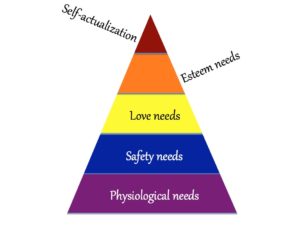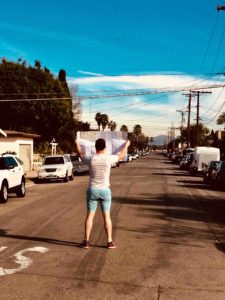So when I turned up at Haverford College back in 1987, I went right to the religious studies department. Where else would you go to learn about what the great thinkers had discovered about life, the universe, and everything?
Religion
I learned a lot about what great theologians thought, like how Aristotle's version of god – the unmoved mover, without change or, really, anything like a human personality – got consolidated with the God of the Old Testament I'd learned about as a kid in Sunday school, who, as I understood it, spent His time stomping around the middle east, favoring some people, smiting others, then smiting lots of the people He'd favored, and favoring the people He'd been smiting.
There's a solution to this problem. It's complicated. In fact, over a couple of centuries the early church fathers, and a few of its mothers, came up with several different solutions, all of which were complicated.
And that was just Christianity.
Religious studies took my questions and gave me more answers that I knew what to do with.
And that's what was supposed to happen.
It made my world richer and more complex, but in the process it multiplied my questions instead of giving me clear answers.
What I did learn, though, was just how varied, mysterious, and complicated real life was – and how important it is to see it in all its complexity. I also learned that all the different angles and ideas and visions I studied weren't directly about the universe. They were about people's perspectives on it. I realized I wasn't studying the actual order out in the universe – it was about the order inside people's heads.
So I moved on to step two:
Psychology
If the meaning of life wasn't out there, it must be in here instead. I learned about the Oedipus complex (dubious) the collective unconscious (mind-blowing) and the idea – which was revolutionary in some circles back then – that morality was related to how people relate to one another, so women often had different answers to moral questions than men did.
So, wait. Men and women have different kinds of minds?
The idea isn't hard to grasp. But if meaning comes from minds, and people have different kinds, it throws a wrench in the works if you're trying to find the single meaning of life.
So: What, exactly is the mind? I wondered.
Philosophy
Majoring in philosophy was basically a product of intellectual musical chairs. When the music stopped and the College expected me to choose one, I was next to the philosophy chair, and that was that. I wasn't great at it, as it turns out, but it did teach me to think rigorously.
Most of the philosophers I've known are verbal thinkers. They think best in words. I learned this when a number of my students came into class complaining about their philosophy professor who made them close their notebooks and just listen. It drove many of them nuts. They were like me – I am very much a visual thinker. I organize everything into pictures in my head. If I can't see it, I don't remember it. And if the students couldn't ink things into shapes on paper, it wouldn't stick. None of my philosophy teachers did this, but I think the mismatch in thinking styles didn't help.
That said, I enjoyed it.
Lots of philosophers, as it turns out, spent their days trying to figure out what the mind was, and how that gave life meaning.
I liked getting into the heads of the philosophers, trying to see things from their perspectives. By the time I was done with philosophy (before the college was ready to let me be finished with it), I had a pretty good idea about what some very smart, very white, very dead men has to say about the how to get at the meaning of life. I just wished that there was a way to do it with people substantially more alive.
So naturally, I hopped to
Literature
The last semester of senior year I read James Joyce's Ulysses. In it, Leopold Bloom wanders around his home town, visiting actual places over the course of an actual day. I dived into the book outside of Philadelphia in 1991 and came up for air in Dublin on June 16, 1904.
And that was amazing. Ulysses' trick tapped in to empathy and imagination, two of the great tools, toys, and gifts that make being human worthwhile.
And through them, I was getting closer to the meaning of life.
Where philosophers explore the big questions stepping back and reasoning things through, though, novelists like Joyce put the meanings in the lives of their characters.
So I realized I'd been looking at it wrong. The meaning of life isn't something that's above or beyond us, or even some great mystery or ineffable truth that applies to us all. The meaning, Leopold showed me, meandering around Dublin, is in life.
This is what Leopold Bloom taught me. It's just too bad, I thought, that he wasn't a real person.
The meaning of life appears in the living. If meaning comes out of your own experience of living in a great big world, then maybe part of doing it well involved doing it a lot.
And That was That.
In 1991, the college handed me a BA and sent me out to try and be an adult.
I was not successful.
For the first few years I didn't live especially well, but I did live fully. Four years after I graduated I was delivering pizza, painting houses, and renting my old room back from my parents. I was recovering from learning how overwhelmingly full a life could be.
I hadn't found the meaning of life, but I was far from where I'd started.
I'd learned how to think rigorously and empathically, how to play with ideas and build them together, and how to see the different meanings and values in the lives that were described to me.
One More Step
Around that time, I discovered a field that studied this sort of thing. If you torque it enough, it lets you explore the meaning of life through other people, and see it, in contrast, reflected in yourself. It was like literature, without the fiction. It was like philosophy, but it looked at the thoughts of ordinary people. It was like psychology, but out in the open instead of the lab.
I figured that if I lived my life fully it would be a good step toward living it well. And I wanted to spend my life actually living it, so I became an anthropologist. It appealed to me because it's a way of looking at life as you experience it, and the meaning in it, as you go along.
I've written a book about this. It starts at the end of the tale I've told here – a few years after I moved into the life of an anthropologist. It explains the processes that bring meaning into lives. It's being published by Macmillan, under the Palgrave imprint, and it should be out later this year. Narrative Practice and Cultural Change: Karma, Ghosts, and Capitalist Invaders in Thailand is based, as you might have guessed, on the years I lived in Bangkok, the stories the my friends there told me, and how they put their lives together there – moving through a world shaped by forces seen and unseen, and making sense of what they know.
The stories are all drawn from my time abroad, but the theory that goes with it is applicable to everyone. To understand your own life, I find, it helps to see things explained about other people first. A little distance is a useful thing.
I'll keep you posted on when the publication date is. In the meantime, I'm back to using the system I pioneered in that book to help understand happiness in the US. The results of that are what you find here.






